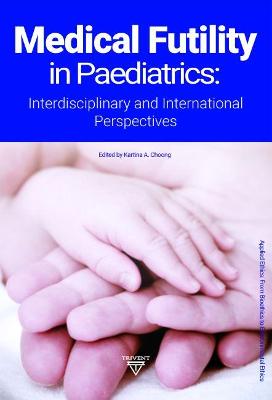Applied Ethics: From Bioethics to Environmental Ethics
1 primary work
Book 3
Medical Futility in Paediatrics
Published 30 August 2019
This book addresses the issues and challenges raised by the high-profile cases of Charlie Gard and Alfie Evans. The individual chapters, which complement one other, were written by scholars with expertise in Law, Medicine, Medical Ethics, Theology, Health Policy and Management, English Literature, Nursing and History, from the UK, Australia, Canada, the Czech Republic, France, Germany, India, Spain, Turkey and the USA.
The following are among the key questions explored in the book. Is the courtroom an appropriate forum for resolving conflicts relating to medical futility in paediatrics? If so, should parental rights be protected by confining judicial powers only to cases where there is a risk of significant harm to the infant; or should the "best interests" test continue to be recognised as the "gold standard" for paediatric cases? If not, should mediation be used instead, but how well would this alternative method of dispute resolution work for medical futility conflicts? Further, should social media be deployed to garner support, and should outsiders who are not fully acquainted with the medical facts refrain from intervening? And, how are comparable situations likely to be managed in different countries? What lessons can be learned from them as well as from religious perspectives?
The following are among the key questions explored in the book. Is the courtroom an appropriate forum for resolving conflicts relating to medical futility in paediatrics? If so, should parental rights be protected by confining judicial powers only to cases where there is a risk of significant harm to the infant; or should the "best interests" test continue to be recognised as the "gold standard" for paediatric cases? If not, should mediation be used instead, but how well would this alternative method of dispute resolution work for medical futility conflicts? Further, should social media be deployed to garner support, and should outsiders who are not fully acquainted with the medical facts refrain from intervening? And, how are comparable situations likely to be managed in different countries? What lessons can be learned from them as well as from religious perspectives?
